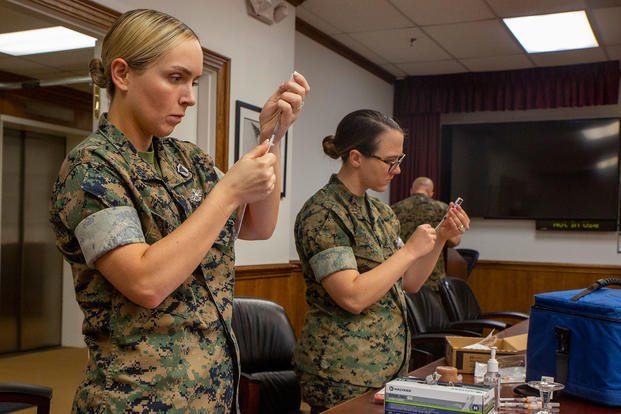A Pentagon watchdog review of the military's COVID-19 vaccine exemption process found that each of the branches largely complied with policies and, in some cases, even went beyond what was required to consider service members' requests for religious accommodation.
While rejecting a number of accusations that the services hadn't properly reviewed waiver requests, the Pentagon's inspector general did fault the Army and Air Force for taking too long to process the requests and wrote in a report released Thursday that discharges were inconsistent, leaving some service members with full benefits while others were left with partial benefits.
The exemption process became the subject of political and legal scrutiny amid the height of the pandemic after some service members filed legal challenges that ultimately made their way to the U.S. Supreme Court.
READ NEXT: Navy Fires Commander of USS Ohio -- 3rd Submarine Skipper Relieved in 7 Months
The investigation was kicked off in February 2022 after the inspector general "received complaints through the DoD Hotline between August 2021 and June 2022 alleging that the Military Services were improperly processing COVID-19 vaccination exemption requests," the report said. "We continued to receive complaints and, on June 2, 2022, the Acting DoD Inspector General issued a memorandum ... to the Secretary of Defense."
That memo told Defense Secretary Lloyd Austin that the watchdog "found a trend of generalized assessments" and "denial memorandums we reviewed generally did not reflect an individualized analysis."
It was an allegation that was key to the arguments of several court cases filed by service members that were largely successful in halting discharges over a refusal to comply with the policy.
However, the inspector general ultimately found no evidence that the services were "rubber stamping" denials, declaring that investigators "found no evidence of a lack of individual review by the decision authorities."
Investigators said that the officials that they interviewed discussed the cases "in detail," but they created approval and denial letter templates to both streamline the process and make sure all the required information was being conveyed to service members.
The allegations of "rubber stamping" even made it to at least one of the offices and prompted discussions among staffers about whether the wording should be altered. Ultimately, the unnamed office kept the templates out of a desire to provide consistency for the denials and out of a fear that more customized letters would suggest service members weren't all being reviewed under the same standard.
The report also noted at one point that some requests were considered by the services, even though they didn't need to be. The report cited four requests by Army soldiers whose chaplains "determined that four Service members did not have sincerely held religious beliefs to support a religious accommodation, as required by DoD policy."
"In each case, the Army decision authority stated that they considered the Service member's request regardless of the chaplain's assessment," the report said.
The Army and Air Force's delays in meeting their 90- and 30-day processing deadlines, respectively, were chalked up to the large volume of requests -- more than 16,000, as of January 2023.
Out of the requests reviewed by the inspector general, the Army's cases averaged 192 days to receive a decision while the Air Force's requests averaged 168 days.
Staffers in the offices that typically handle exemption requests told investigators that they normally handled just a few requests per year and on simpler topics such as grooming or clothing -- not something as complex as vaccinations.
Investigators also faulted the services for discharging service members under varying discharge types or reentry codes. While the report explained that "this occurred because the DoD did not have department-level guidance requiring uniformity," they nevertheless pointed out that "service members experienced different impacts to their educational benefits and eligibility to reenlist in military service after discharge."
The report recommended that the Pentagon review its exemption process to try to increase its efficiency "during periods of high-volume requests" and create a better policy to standardize reentry codes. It also noted that both recommendations were accepted by the Defense Department, which has already begun making changes.
Related: Military Services Will Amend COVID Vaccine Refuser Records So They Aren't Passed Over for Promotions












